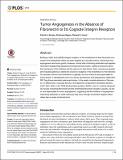| dc.contributor.author | Begum, Shahinoor | |
| dc.contributor.author | Murphy, Patrick Andries | |
| dc.contributor.author | Hynes, Richard O | |
| dc.date.accessioned | 2015-05-29T14:37:34Z | |
| dc.date.available | 2015-05-29T14:37:34Z | |
| dc.date.issued | 2015-03 | |
| dc.date.submitted | 2014-12 | |
| dc.identifier.issn | 1932-6203 | |
| dc.identifier.uri | http://hdl.handle.net/1721.1/97114 | |
| dc.description.abstract | Binding of α5β1 and αvβ3/β5 integrin receptors on the endothelium to their fibronectin substrate in the extracellular matrix has been targeted as a possible means of blocking tumor angiogenesis and tumor growth. However, clinical trials of blocking antibodies and peptides have been disappointing despite promising preclinical results, leading to questions about the mechanism of the inhibitors and the reasons for their failure. Here, using tissue-specific and inducible genetics to delete the α5 and αv receptors in the endothelium or their fibronectin substrate, either in the endothelium or globally, we show that both are dispensable for tumor growth, in transplanted tumors as well as spontaneous and angiogenesis-dependent RIP-Tag-driven pancreatic adenocarcinomas. In the nearly complete absence of fibronectin, no differences in vascular density or the deposition of basement membrane laminins, ColIV, Nid1, Nid2, or the TGFβ binding matrix proteins, fibrillin-1 and -2, could be observed. Our results reveal that fibronectin and the endothelial fibronectin receptor subunits, α5 and αv, are dispensable for tumor angiogenesis, suggesting that the inhibition of angiogenesis induced by antibodies or small molecules may occur through a dominant negative effect, rather than a simple functional block. | en_US |
| dc.description.sponsorship | National Institutes of Health (U.S.) (Grant 5F32HL110484) | en_US |
| dc.description.sponsorship | National Institutes of Health (U.S.) (Grant PO1-HL66105) | en_US |
| dc.description.sponsorship | Howard Hughes Medical Institute | en_US |
| dc.description.sponsorship | National Cancer Institute (U.S.) (Koch Institute Support (Core) Grant P30-CA14051) | en_US |
| dc.language.iso | en_US | |
| dc.publisher | Public Library of Science | en_US |
| dc.relation.isversionof | http://dx.doi.org/10.1371/journal.pone.0120872 | en_US |
| dc.rights | Creative Commons Attribution | en_US |
| dc.rights.uri | http://creativecommons.org/licenses/by/4.0/ | en_US |
| dc.source | Public Library of Science | en_US |
| dc.title | Tumor Angiogenesis in the Absence of Fibronectin or Its Cognate Integrin Receptors | en_US |
| dc.type | Article | en_US |
| dc.identifier.citation | Murphy, Patrick A., Shahinoor Begum, and Richard O. Hynes. “Tumor Angiogenesis in the Absence of Fibronectin or Its Cognate Integrin Receptors.” Edited by Hiromi Yanagisawa. PLOS ONE 10, no. 3 (March 25, 2015): e0120872. | en_US |
| dc.contributor.department | Massachusetts Institute of Technology. Department of Biology | en_US |
| dc.contributor.department | Koch Institute for Integrative Cancer Research at MIT | en_US |
| dc.contributor.mitauthor | Murphy, Patrick Andries | en_US |
| dc.contributor.mitauthor | Begum, Shahinoor | en_US |
| dc.contributor.mitauthor | Hynes, Richard O. | en_US |
| dc.relation.journal | PLOS ONE | en_US |
| dc.eprint.version | Final published version | en_US |
| dc.type.uri | http://purl.org/eprint/type/JournalArticle | en_US |
| eprint.status | http://purl.org/eprint/status/PeerReviewed | en_US |
| dspace.orderedauthors | Murphy, Patrick A.; Begum, Shahinoor; Hynes, Richard O. | en_US |
| dc.identifier.orcid | https://orcid.org/0000-0001-7603-8396 | |
| mit.license | PUBLISHER_CC | en_US |
| mit.metadata.status | Complete | |
